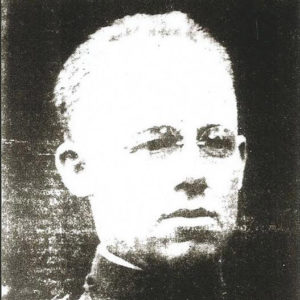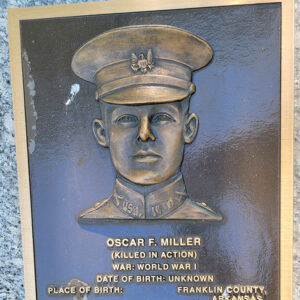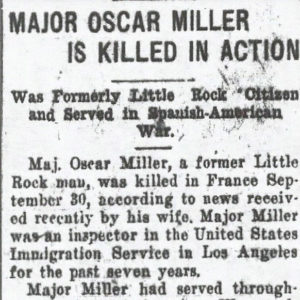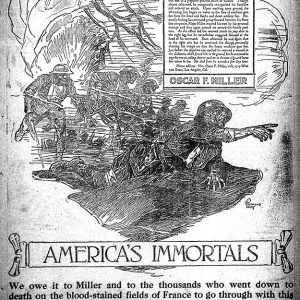calsfoundation@cals.org
Oscar Franklin Miller (1882–1918)
Oscar Franklin Miller was an Arkansas-born U.S. Army major who achieved national fame during World War I and received the Medal of Honor and the Bronze Star for his valor during a battle near Gesnes, France, in which he lost his life. Before he enlisted in the army, Miller worked throughout the United States as a clerk and an officer for the Immigration and Naturalization Service (INS).
Oscar Miller was born in Franklin County on October 25, 1882, the third of eight children of A. J. Miller and his wife. He spent his early childhood in Bryant (Saline County). After his father died when he was eight years old, Miller and four of his siblings—Ruth, Grace, Helen, and Bill—were raised by his paternal grandmother. In 1899, he left Arkansas for Texas looking for work; he worked briefly for a publishing house as a “printer’s devil,” where he set type and delivered newspapers. Later, he found a job as a waiter, which gave him a chance to learn to speak Spanish, a skill that helped him later in his career.
He quit his job as a waiter and joined the U.S. Army in 1901. Before his three-year enlistment was complete, he served as a company clerk and interpreter for the Twenty-eighth U.S. Infantry in the Philippines. Returning to the United States, he found himself facing unemployment. He eventually got a job as a clerk for the U.S. Mail Service in Little Rock (Pulaski County). There, he began to show the impatient, individualistic streak that characterized his later career in the INS and as a soldier; he was often reprimanded for failing to observe the chain of command and for the bluntness with which he approached situations. These qualities, though a service in his future, were a source of conflict during his time in Little Rock.
In Little Rock, he met Anna Conrad, the daughter of a well-known city police chief, and soon married her. They had one child, Oscar Franklin Jr.
In 1907, the Millers left Arkansas and made their home in Laredo, Texas. For the next ten years, Miller worked as an immigration officer for the INS in Texas, Arizona, and Los Angeles, California, patrolling the border and helping to apprehend undocumented migrants. Miller’s work was exciting and efficient; he was praised for his successful missions and given several pay raises. His effective use of patrol boats on U.S.–Mexico water routes resulted in his travel to Washington DC, where he convinced the Bureau of Immigration that the INS should have a greater supply of them.
In 1917, he left the INS and enrolled in reserve officers’ training in California. By the time he was called to active duty, he had performed so well that he was one of two students to be promoted to the rank of major for the 361st Infantry, Ninety-first Division. Not long after this, at a family reunion in Arkansas, he was reported as saying, “There is no more glorious death than to die on the battlefield.”
Miller arrived in England, and then France, for more training in July 1918. By September of that same year, Miller’s divisions were moving around the pits and trenches in the Argonne Forest in France. On September 27, his Third Battalion arrived at the village of Epionville, where he was told he would be able to make “the next big attack.” The next day, an attack was made on German forces who were hiding in the trenches to counter the American attack with a barrage of bullets. Many of Miller’s men were wounded or killed very quickly, and Miller himself took a bullet in his right leg. Before being shot again, he managed to make it another fifty feet. A captain carried his body off the battlefield; he died in a dressing station at 1:30 a.m. on September 29.
Miller was presented the Medal of Honor for “conspicuous gallantry and intrepidity above and beyond the call of duty in action…Major Miller inspired his men by his personal courage. Just before the objective was reached he received a wound in the abdomen…but he continued to urge his men on, telling them to…leave him where he lay.” He is buried in a marked grave in the Meuse-Argonne American Cemetery in France.
For additional information:
Medal of Honor Recipients: World War I. https://www.army.mil/medalofhonor/citations16.html (accessed March 9, 2022).
Johnson, John Allen. “Oscar Franklin Miller: Arkansas’s Forgotten Hero.” Arkansas Historical Quarterly 31 (Autumn 1972): 262–275.
Ware, David. Beyond the Call of Duty, Arkansas Honors Its Veterans. Little Rock: Arkansas Office of Secretary of State, 2002.
Bernard Reed
Little Rock, Arkansas
 Early Twentieth Century, 1901 through 1940
Early Twentieth Century, 1901 through 1940 Military
Military Oscar F. Miller
Oscar F. Miller  Oscar F. Miller Plaque
Oscar F. Miller Plaque  Oscar Miller Death Notice
Oscar Miller Death Notice  Oscar Miller Tribute
Oscar Miller Tribute 




Comments
No comments on this entry yet.